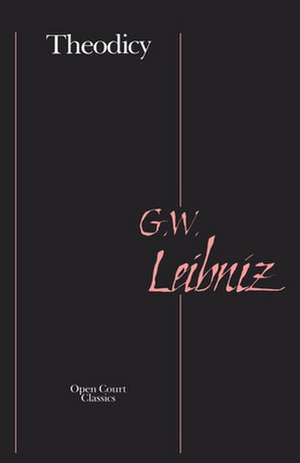Theodicy: Essays on the Goodness of God, the Freedom of Man, and the Origin of Evil
Autor Gottfried Wilhelm Leibniz Editat de Austin Marsden Farrer Traducere de E. M. Huggarden Limba Engleză Paperback – 30 noi 1988
| Toate formatele și edițiile | Preț | Express |
|---|---|---|
| Paperback (3) | 127.60 lei 6-8 săpt. | |
| Open Court Publishing Company – 30 noi 1988 | 281.10 lei 3-5 săpt. | |
| Lector House – 25 iul 2019 | 127.60 lei 6-8 săpt. | |
| COSIMO CLASSICS – 30 iun 2010 | 171.58 lei 6-8 săpt. |
Preț: 281.10 lei
Nou
Puncte Express: 422
Preț estimativ în valută:
53.79€ • 55.49$ • 44.89£
53.79€ • 55.49$ • 44.89£
Carte disponibilă
Livrare economică 05-19 martie
Preluare comenzi: 021 569.72.76
Specificații
ISBN-13: 9780875484372
ISBN-10: 0875484379
Pagini: 448
Dimensiuni: 141 x 217 x 29 mm
Greutate: 0.58 kg
Editura: Open Court Publishing Company
Locul publicării:United States
ISBN-10: 0875484379
Pagini: 448
Dimensiuni: 141 x 217 x 29 mm
Greutate: 0.58 kg
Editura: Open Court Publishing Company
Locul publicării:United States
Descriere
In order to be truly free, must you act arbitrarily? If an event did not happen, could it have happened? Since there is evil, and God could have made the world without evil, did God fail to pick the best course? Grappling with such simple--yet still intriguing--puzzles, Leibniz was able to present attractively his new theories of the real and the phenomenal, freewill and determinism, and the relation between minds and bodies. Theodicy was Leibniz's only book-length work to be published in his lifetime, and for many years the work by which he was known to the world. Fully at home with the latest scienctific advances, Leibniz ultimately rejected the new atomistic philosophies of Descartes, Gassendi, and Hobbes, and drew upon the old cosmology of Aristotelian scholasticism. There could be no conflict, he argued between faith and reason, freedom and necessity, natural and divine law. Ingeniously defending his postulate of pre-established harmony, Leibniz made important advances in the precise analysis of concepts.
